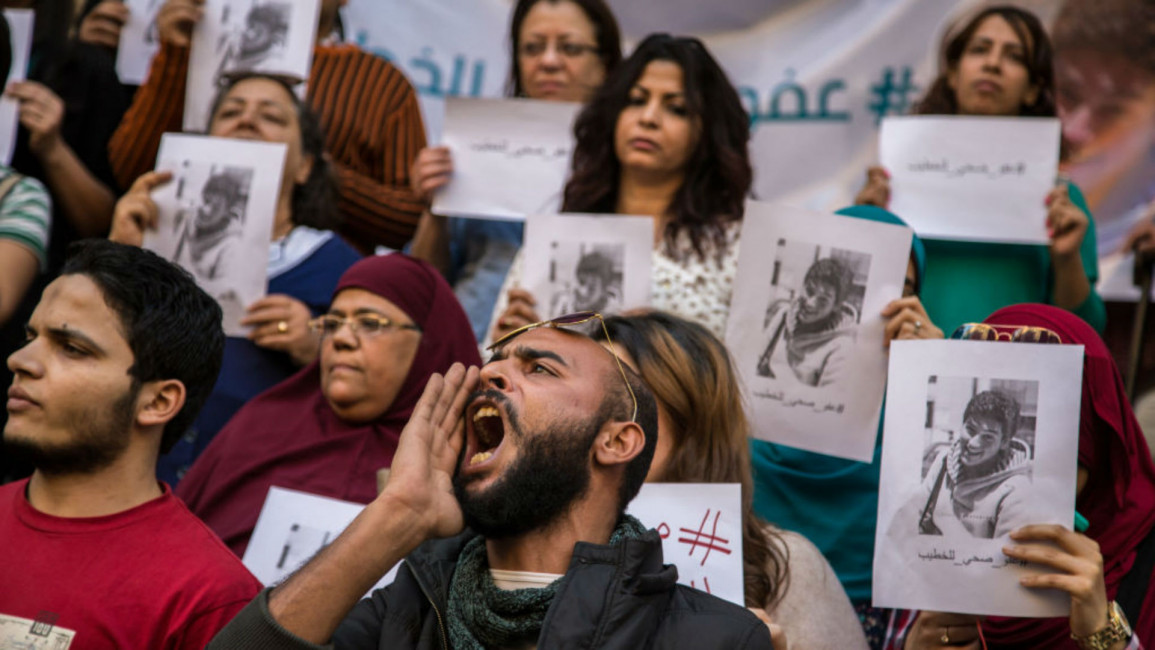
In Sisi's Egypt, collective punishment is tearing entire families apart
In a recent Facebook post, an Egyptian writer commented that anyone who survived Abdel Fattah al-Sisi's regime would be the subject of a National Geographic documentary entitled 'The Last Survivors'.
It certainly is a struggle for to stay alive in Egypt where students, protesters, and the politically active are being swallowed up into a dark hole. Some 60,000 political prisoners are currently incarcerated and 1,300 people have been forcibly disappeared.
The arrest of so many people is a tool of repression used by the regime, mostly against anyone who opposes the government. But not all of those imprisoned are even politically active - some were just in the wrong place at the wrong time, others are family members of people who are considered enemies of the state.
An example of this collective punishment is the case of Ola Al-Qaradawi, who is now the Egypt's longest-standing female political prisoner in solitary confinement.
Ola, who isn't politically active, is being punished because her father is the influential Egyptian scholar Yusuf al-Qaradawi, who once openly criticised the military coup, and who lives in exile in Qatar. The Gulf state has been blockaded by Saudi Arabia, the UAE, Bahrain and Egypt for nearly a year now, and the bloc is demanding his extradition as one of the conditions for lifting the restrictions.
Another is Ahmed al-Walid, a young man who was sentenced to death for allegedly killing a police officer in a case that became known as the Mansoura Six. His sentence drew considerable attention in Egypt because with his arrest Ahmed's mother lost all three of her sons. One was killed during the August 2013 Rabaa massacre, and another was forcibly disappeared after he spoke out about his brother's death.
Twitter Post
|
Of course, the regime doesn't have to imprison multiple members of one family to shatter the others' lives, just the knowledge that your son or mother is being tortured inside prison is enough for that.
This is just one tactic being played out in Egypt right now – unfortunately there are many others.
Under the guise of their"war on terror" in Sinai, authorities have tightened security around the tunnels which connect the peninsula and Egypt's mainland. People attempting to cross are regularly sent back to Sinai or Egypt, even if they have family on the other side.
This month, Egypt began erecting a barbed wire fence close to its border with Gaza to separate Rafah City from the buffer zone, a no man's land Sisi pledged to build in October 2014 on the pretext that terrorists and explosives were being smuggled through the tunnels.
Since the army launched Operation Sinai on 9 February this year, at least 3,000 homes have been destroyed to create this buffer zone, Human Rights Watch reported last week. Extended families who have lived beside each other for decades are now dispersed and homeless. Many report that they have not received the promised compensation.
Recently, we were reminded of the army's gruesome practice of extrajudicial killings when a video of a young man begging for his mother moments before he was shot by an Egyptian reserve officer, was shared on social media. Last year the al-Awabdah brothers, aged 16 and 19, were among the victims who suffered a similar fate.
 |
Without evidence someone has been kidnapped by the state, it's harder to mount a legal challenge |  |
Often, when family members disappear, the others campaign for their freedom, and incarcerating - or in this case shooting - them is an attempt to intimidate others into withdrawing.
One of the reasons enforced disappearances take place is that without evidence someone has been kidnapped by the state, it's harder to mount a legal challenge - Egypt has taken this one step further and just taken away the lawyers themselves. Ezzat Ghoneim, Haitham Mohamedeen and Malek Adly are just some of the human rights lawyers who have been targeted in the line of duty.
Read more: Prominent Egyptian scholar Qaradawi sentenced to life in prison
Another is Ibrahim Metwally Hegazy, one of the founders of the Association of the Families of the Disappeared.
In September 2017 Hegazy prepared to take a flight to Geneva where he planned to raise the case of Giulio Regeni, the Italian doctorate student who was tortured to death by Egyptian security forces. Hegazy never made it, for he was forcibly disappeared at Cairo airport.
Hegazy's association offers advice and legal assistance to desperate families, a subject close to Hegazy's heart since his son Amr Ibrahim Metwally was forcibly disappeared during the post-coup protests in 2013.
 |
With his arrest, Ahmed's mother lost all three of her sons |  |
His youngest son said Ibrahim saw himself as a father to all the young people at risk of being persecuted by the state. No wonder authorities hated him, he is brave and principled; everything they are not.
If the purpose of this collective punishment is to stamp out civil disobedience before it takes place again, Ibrahim's desire to seek justice proves that while families pay a huge price for doing so, it hasn't worked.
Amelia Smith is a writer and journalist who has reported from across the Middle East and North Africa. In 2016 she was a finalist in the Write Stuff writing competition at the London Book Fair.
Her first book, The Arab Spring Five Years On, was published in 2016.
Follow her on Twitter: @amyinthedesert
Opinions expressed in this article remain those of the author and do not necessarily represent those of The New Arab, its editorial board or staff.




